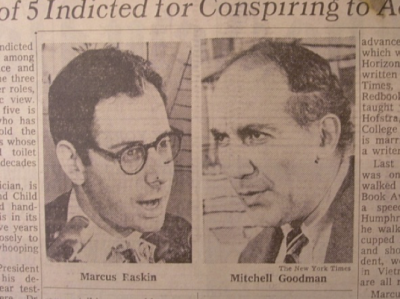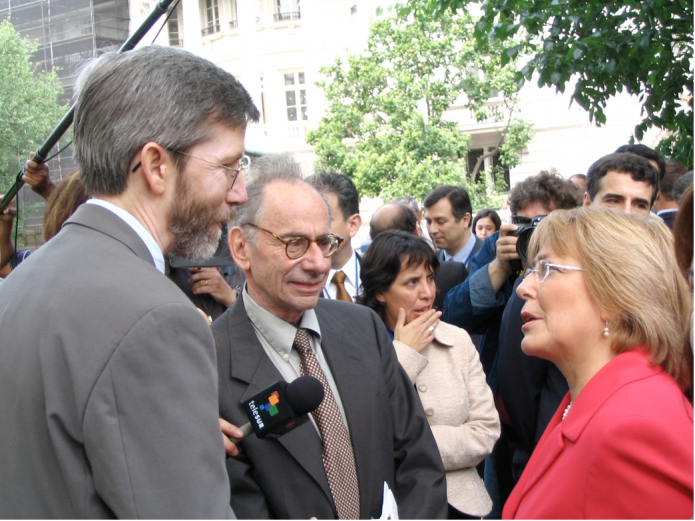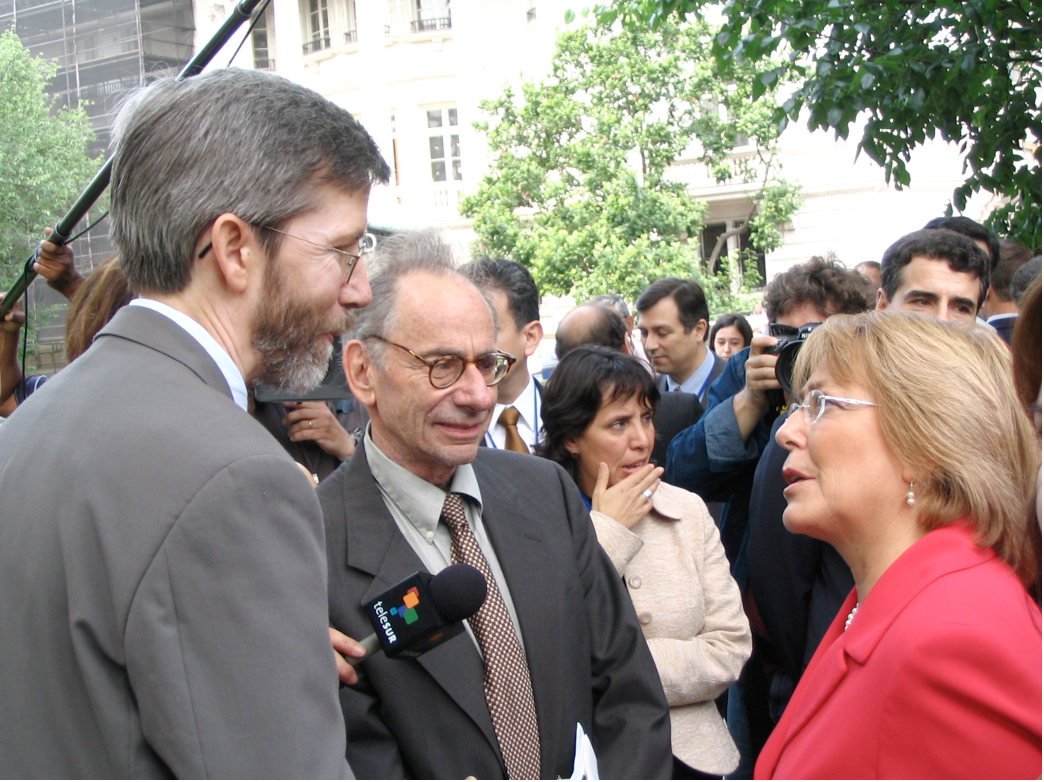A memorial service and celebration of Marcus Raskin and his work was held on February 12. Find speeches from the memorial service here.
Help keep Marc’s vision alive by supporting the Raskin Memorial Fund at IPS.
Institute for Policy Studies staff and friends are mourning the loss of Marcus G. Raskin, who co-founded the Institute in 1963 and remained a Distinguished Fellow of the organization until his death at age 83 on December 24.
Raskin was an intellectual pillar of the movements for progressive social change for more than a half century. In 1962, Raskin resigned a post at the National Security Council after watching the Cuban missile blockade bring the world to the brink of nuclear incineration and the disastrous U.S. military build-up in Vietnam. He founded the Institute for Policy Studies with fellow Kennedy administration official Richard Barnet in 1963 and built the organization into the leading progressive, multi-issue think tank in the nation’s capital.
The author of more than 20 books, Raskin spent much of his career calling and organizing for the dismantling of the “national security state” (a term he coined) and the wars it created, and the reconstruction of institutions to support real democracy in the United States as well as movements to build internationalism and universal human rights.
Early years
 Born in Milwaukee in 1934, Raskin was a piano prodigy who left home to study at New York’s Juilliard School at the age of 16. Although he remained an accomplished pianist throughout his life, he abandoned a career in music to study politics and law at the University of Chicago.
Born in Milwaukee in 1934, Raskin was a piano prodigy who left home to study at New York’s Juilliard School at the age of 16. Although he remained an accomplished pianist throughout his life, he abandoned a career in music to study politics and law at the University of Chicago.
In 1958, he moved to Washington, where he became legislative council to a number of congressmen before entering the White House as a member of the National Security Council’s Special Staff, working under National Security Adviser McGeorge Bundy. In 1962, he was a member of the U.S. delegation to an 18-nation disarmament conference in Geneva. However, tensions ran high with Bundy, who supported the escalation of U.S. military engagement in Indo-China at that time, and Raskin decided to pursue a dream of creating an independent institution outside government to critique official policy and mobilize support for alternative approaches.
The Institute’s First Decade
 Much of Raskin’s initial work with IPS focused on opposing the Vietnam war. He co-authored the Vietnam Reader with Bernard Fall, which was used in dozens of teach-ins across the country and became the bible of a rising generation of anti-war activists. In 1968, he shared the honor of being indicted—along with William Sloane Coffin, Dr. Benjamin Spock and two others known as the “Boston 5”—for conspiracy to aid resistance to the draft. Not long after his acquittal, he published the book Washington Plans an Aggressive War, with Barnet and Ralph Stavins.
Much of Raskin’s initial work with IPS focused on opposing the Vietnam war. He co-authored the Vietnam Reader with Bernard Fall, which was used in dozens of teach-ins across the country and became the bible of a rising generation of anti-war activists. In 1968, he shared the honor of being indicted—along with William Sloane Coffin, Dr. Benjamin Spock and two others known as the “Boston 5”—for conspiracy to aid resistance to the draft. Not long after his acquittal, he published the book Washington Plans an Aggressive War, with Barnet and Ralph Stavins.
1970s to 2000
With the publication of his book Being & Doing to rave reviews in 1971, Raskin became the country’s leading thinker on the theory of “social reconstruction.” According to Library Journal, Raskin “foresees a peaceful process of non-Marxist reconstruction that will replace authoritarianism and the status quo with politics of the people and a redefined social ethic.” The San Francisco Chronicle called it “a watershed book, an important indictment of our society by a political thinker who in some quarters is held to be the most brilliant in the field.”
In 1977, 56 members of Congress, led by members of the Congressional Black Caucus, requested that IPS undertake a thorough analysis of the federal budget. Raskin directed the project, which led to the publication of the 1978 book The Federal Budget and Social Reconstruction. In the 1980s, Raskin became a leader in the anti-nuclear movement as the Chair of the Sane Freeze campaign. He also worked with labor leaders to organize the Progressive Alliance, a coalition of 16 labor unions and 100 public interest groups that laid out a progressive alternative political agenda.
In 1994, Raskin convened a meeting of prominent thinkers to plot out a series of books and activities that would chart an alternative course for the new millennium. He published his own thoughts on the end of the 20th century in 1998, in the book Visions and Revisions. Library Journal commented that “At a time when the political Left in general, and the Democratic party specifically, stands in a state of almost total disarray, individuals of that political persuasion must look long and hard for a confident and articulate spokesperson. Raskin comes about as close to fulfilling this role as one is likely to find. In this collection of essays, Raskin … offers a broadly based critique of both our own political culture and the world’s. Calling for a thoroughgoing reconstruction (in place of the current deconstruction offered by the Right), Raskin attempts to formulate the philosophical basis for a revitalized liberalism.”
2003 – 2017

Following the 9/11 attacks, Raskin helped lead the Institute’s work in crafting calls for alternative, non-military responses to those crimes. In addition to teaching at George Washington University’s School of Public Policy, Raskin published three works of nonfiction in the 2000s, Liberalism: The Genius of American Ideals; In Democracy’s Shadow: The Secret World of National Security, with American University professor Carl LeVan; and The Four Freedoms under Siege: The Clear and Present Danger from Our National Security State, with the journalist Robert Spero.
In 2003, he conceptualized the network of local elected officials that evolved into IPS’s Cities for Peace project, which coordinated hundreds of city council resolutions against the Iraq War. He also produced three recordings of piano compositions, including Elegy for the Cold War (Mapleshade Records, 2004).
Raskin was also the editor of a series of books laying out Paths for the 21st Century. The goal of this project was to generate ideas and proposals across disciplinary lines that catalyze citizen action and help other scholars and activists pursue their own inquiries. The project published three books – on economic justice (by Robin Hahnel), the business of America (by Saul Landau), and American ideology (by Andrew Levine). Raskin’s final publication was Warfare Welfare: The Not-So-Hidden Costs of America’s War Economy, co-edited with Gregory Squires.
Throughout his work at IPS, Raskin remained committed to supporting the work of progressive social movements, and especially to mentoring new generations of public scholars. In all his work, Raskin aimed, in his words, “to re-factualize,” or present facts in a new way that can change consciousness. Over more than five decades, he undoubtedly challenged and transformed the consciousness of hundreds of young scholars, thousands of progressive activists, and scores of policy- and opinion-makers.
“Marc thought big and he proposed much of the boldest work IPS has done,” said IPS Director John Cavanagh. “We are truly blessed that he built such a strong and courageous institution.”
Accolades
“Marc Raskin is America’s most important intellectual.” — Joseph D. Duffy, former chairman of the National Endowment for the Humanities
“Raskin is a fascinating figure, the epitome—like Sartre or Marx—of the intellectual engagé.” — Doug Ireland, 1980
“Raskin brings a unique and creative imagination to the examination and illumination of today’s issues.”— George McGovern, 1986
“Marcus Raskin’s analysis of our current condition and prospects for the future is thoughtful and human, and eminently practical.”— Noam Chomsky, 1986
“Raskin is an original thinker, who has been living what he writes through his work with IPS.” — J. William Fulbright, 1991
“If there were a few more citizens like him—tough, skeptical, and alert—American democracy might cease to be a spectator sport and become a viable enterprise.” — Barbara Ehrenreich, 1991
“Marc Raskin remains an original voice for sanity and true democracy in running the nation’s security affairs.” — Seymour Hersh, 1991
“Raskin’s greatest contributions to three decades of debate over foreign and defense policy were his 1960s epiphanies of the national security state. He urges us to dismantle this state, which has disfigured American public life with its enshrinement of executive privilege, secretive bureaucracies, and neglect of the domestic order. The prescriptions for what to build in its place stem from Raskin’s irrepressible idealism, optimism—and moralism.” — Robert L. Beisner, Washington Post, 1991
“Marcus Raskin is unquestionably our foremost theoretician and practitioner of liberalism.” — Richard Falk, Princeton University, 2004
Books by Marcus Raskin
- The Limits of Defense, with Arthur Waskow (l962)
- The Vietnam Reader, with Bernard B. Fall (1965)
- A Citizen’s White Paper on American Policy in Vietnam and Southeast Asia (1965)
- After 20 Years: Alternatives to the Cold War in Europe, with by Richard J. Barnet (1965)
- Being and Doing: An Inquiry Into the Colonization, Decolonization and Reconstruction of American Society and Its State (1971)
- Washington Plans An Aggressive War, with Ralph L. Stavins and Richard J. Barnet (1971)
- An American Manifesto, with Richard Barnet (1971)
- Notes on the Old System: To Transform American Politics (1974)
- The American Political Deadlock: Colloquium on Latin America and the United States: Present and Future of their Economic and Political Relations, Oaxtepec (1975)
- Next Steps for a New Administration (1976)
- The Federal Budget and Social Reconstruction: The People and the State (1978)
- The Politics of National Security (1979)
- The Common Good: Its Politics, Policies, and Philosophy (1986)
- New Ways of Knowing, with Herbert J. Bernstein (1987)
- Winning America: Ideas and Leadership for the 1990s, with Chester Hartman (1988)
- Essays of a Citizen: From National Security State to Democracy (1991)
- Abolishing the War System: The Disarmament and International Law Project of the Institute for Policy Studies and the Lawyers Committee on Nuclear Policy (1992)
- Presidential Disrespect: From Thomas Paine to Rush Limbaugh – How and Why We Insult, Scorn and Ridicule Our Chief Executives, with Sushila Nayak (1997)
- Visions and Revisions: Reflections on Culture and Democracy at the End of the Century (1998)
- Liberalism: The Genius of American Ideals (2003)
- In Democracy’s Shadow: The Secret World of National Security, with Carl LeVan (2005)
- The Four Freedoms Under Siege: The Clear and Present Danger from Our National Security State, with Robert Spero (2006)
- Warfare Welfare: The Not-So-Hidden Costs of America’s War Economy, co-edited with Gregory Squires (2012)
